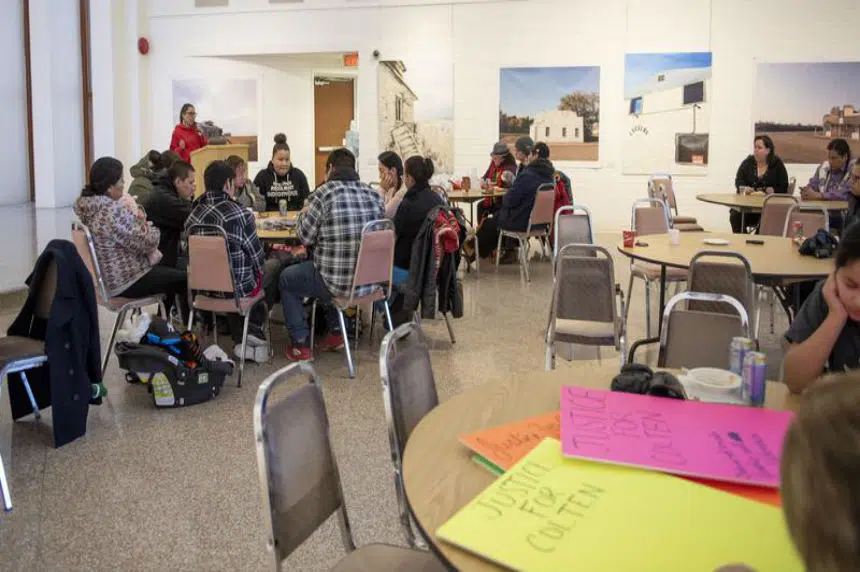Alvin Baptiste sat cross-legged on the floor of a raised stage at the front of The Chapel Gallery. He was flanked by a handful of young men to his right and a dozen or so women to his left.
The smell of sage and tobacco quickly filled the small confines of the exhibit as they began a pipe ceremony.
An elder in front of Baptiste begins to pray and everyone bows their head.
Among the small audience gathered Saturday afternoon were the relatives and close friends of Colten Boushie, the 22-year-old from the Red Pheasant Cree Nation who was killed on a farm near Biggar in August 2016.
The day marked the anniversary of the not guilty verdict handed down by a Court of Queen’s Bench jury to Gerald Stanley in the shooting death of Boushie.
Colten’s brothers Jace and William said the past week has been a flurry of remembrance of their brother. He said turning to prayer and culture are key.
“It is still a big hole in your life,” William said before taking a long sigh and dropping his head.
“A great big hole it will never go away,” Jace said, adding it has not gotten easier one year later and was hesitant when asked if he thought it ever would.
Both have families of their own and Jace said “being in this state of post traumatic stress, it is not good for our children.”
William said the entire ordeal continues to make him feel uneasy about the next generation of Indigenous youth.
During the trial in 2018, Stanley testified that a Ford Escape pulled into his yard, up to a quad and someone tried to start it. At this point, Stanley and his son yelled and ran toward the vehicle.
The vehicle ended up crashing and Stanley said he grabbed a Tokarev semi-automatic pistol and fired warning shots into the air. He said he believed the gun was empty when he walked up to the SUV and attempted to turn it off, struggling with the driver, Boushie.
He said the gun “just went off” and shot Boushie in the head.
Thousands across the nation quickly took to the streets and social media. Some decried systemic racism in Canada’s justice system, while those fed up with rampant crime plaguing rural areas saw justice in the decision.
Eleanore Sunchild, a lawyer who represented the Boushie family, has stood beside them ever since. She recounted details of the trial when she took the podium during the evening.
“If there were Indigenous jurors on that jury, there would have been a different verdict,” she said, decrying bias, faulty police conduct and evidence throughout the case.
“But tonight is about Colten and his memory,” she said.
Colten’s mother Debbie Baptiste rested her head in her hands and held back tears as she Sunchild spoke.
Other family members comforted each other as they remembered details from the week of the trial and the entire ordeal, right back to the night the RCMP came to Debbie’s home and informed her of his death.
The family has pushed for judical reform ever since with an emphasis on seeing more Indigenous jurors, Crown prosecutors and judges.
Sunchild, Jace and William each pointed to the recent coroner’s inquest into the death of Brydon Whitstone as a miniscule glimmer of hope that their work had not fallen on deaf ears, when visibly Indigenous jurors were present.
“What I seen is equality and fairness. That was really nice to see,” Jace said. “It is a start.”
tyler.marr@jpbg.ca
On Twitter: @JournoMarr







